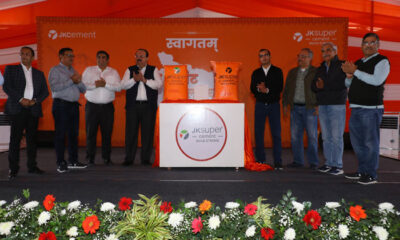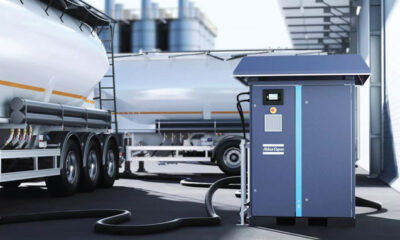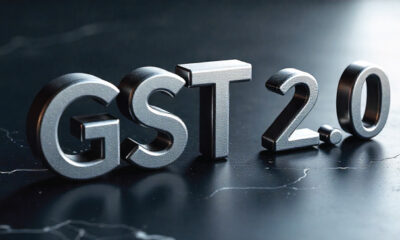Economy & Market
Cement Industries wobble in Q2
Published
8 years agoon
By
admin
With GST rolling over at the start of quarter of July-September 2017, the cement industry was caught off guard about the new process, but more than euphoric on the One Nation One Tax regime. Pegged under the highest slab rate of 28 per cent, the cement industry was found wobbling under the new tax regime due to the temendous paper work, added with the inconsistency in the chain’s backward and forward link. Other problems include the temporal problem fixing by the government and above all multiple rates for buying raw materials and selling final goods.
The GST rates and the processess kept tinkering in order to overcome pointed anomalies and issues relating to filing of the returns. Nevertheless, the quarter being seasonally dull for the cement industry due to low construction activity during monsoon, and with falling production volumes, the performance of most of the companies was under strain from both, the demand and the supply side. Further, points such as the avaliability of sand, the ban on the usage of petcoke and furnace oil will continue to haunt the cement companies. Nitin Madkaikar reviews the performance of cement companies during the quarter July to September 2017, only to come to a conclusion that there is long way to go under the new tax regime for all related activities to be on the same page.
Financial results of 33 large and small cement companies which represent around 50 per cent of the sales for the quarter ended September 2017 showed a growth of 12 per cent in top line in a year on year (YOY) comparison but down 16per cent sequentially (September over June). The bottom line was negative in both comparisons declining sequentially by 5.6 per cent and 42 per cent respectively. These companies are categorised into large (those with quarterly net sales of over Rs.1,000 crore), medium (those with net sales of Rs.200-1,000 crore) and small (companies with net sales of less than Rs.200 crore). The financial results of quarters ending September 2016, June 2017 and September 2017 are considered for review in this analysis.
In the previous quarter, (June 2017) the cement business had suffered due to the wholesalers and retailers reducing stocks prior to the Goods and Services Tax (GST) roll out. This quarter was mired by the implementation of the new tax regime, the GST, resulting in performance below market expectation. Nevertheless, the quarter is seasonally dull for cement business due to low construction activity during the South West monsoon.
Of the 33 companies under review, 10 companies posted declined in yoy sales (including 4 large) but QoQ decline was posted by 23 companies (including 6 large companies). So top line was down across categories and not for a particular category. Similarly, yoy net profits were down in 18 companies (including 7 large companies) while QoQ saw net profits down in 24 companies (including 8 large companies). This implies, the bottom line was adversely affected across all size of companies.
The overall profitability (Net Profit/Net Sales) was at 6.1 per cent in September 2017 quarter, down from 7.3 per cent in quarter of September 2016 and 9 per cent in quarter of June 2017. Almost all companies could manage to post positive margin excepting five companies who recorded net loss during the September 2017 quarter. Only three companies Ambuja Cements, Ramco Cements and OCL India could manage to maintain their margins across three quarters under review. 16 companies saw profitability drop below their levels a year ago while 24 companies saw profitability levels below previous quarter.
The weak performance can also be drawn from the macro factors like production. In Q1 2017-18, total cement production was down 3.3 per cent year on year (at 73 million tons) which could not revive in Q2 and fell again although marginally by 0.4 per cent (68 million tons). Thus, the first half of 2017-18 saw production fall 2 per cent compared to 5 per cent increase (in similar comparison) in the same period a year ago. The GDP growth also tapered in Q1 2017-18 to 5.7 per cent but recovered slowly to 6.3 per cent in Q2. Many GDP growth predictions for the year are revisited but mostly points towards a lower economic growth for the year.
Prospects
As per the predictions of industry experts, there will be a growth in the industry at 5-6 per cent CAGR between FY’17 and FY’20 and the domestic consumption is set to out pace the supply in the next three fiscal years. In the Union Budget 2017-18, Rs 22,500 crore was allocated to achieve government’s mission of ‘Housing for All by 2022’. the housing sector alone accounts for nearly 67 per cent of the total cement consumption in India. The increased allocation to rural low-cost housing under Pradhan Mantri Awaas Yojana- Gramin scheme to Rs 23,000 crore is likely to result in a rise of 2 per cent in the cement demand.
For the year, the cement demand is expected to register a modest rise of 1 per cent in 2017-18 pushed by pick-up in affordable and rural housing and road and irrigation projects, said rating agency ICRA. As per the agency, the cement offtake was weak in first half of the year which extended into October due to factors like weak real estate activity, sand shortage and GST implementation issues. However, new project announcements from private sector will remain weak. The demand is expected to rebound in from the fourth quarter of the year as against the earlier expectation of the third quarter, the rating agency said.
Company-wise Performance Ambuja Cement
Ambuja Cement delivered strong numbers while focusing on brand building, through differentiated offerings for individual home builders, building and infrastructure segments. According to Ajay Kapur, Managing Director and CEO, the company’s strategy to focus on key markets, premium products and value based pricing has paid off, leading to strong net sales and EBITDA growth.
During July-September 2017 quarter Ambuja Cement recorded higher sales and growth in value-added pricing, but it also faced cost pressures relating to rising fuel costs, packaging and raw material prices. Thus, there has been a move to increase the use of petcoke and alternative fuels further, as against 67 per cent it achieved in June 2017. Ambuja Cement’s net sales rose 14 per cent YOY to Rs 2,320 crore even as sales volume grew slower at 11.6 per cent to 5.02 million ton. Net profits, however, moderated 2 per cent to Rs 272 crore for the quarter. EBITDA per ton rose 3 per cent to Rs 706.
UltraTech cement
UltraTech Cement reported a 28 per cent decline in net profit (in standalone) to Rs 431 crore for the quarter ended September 2017. It had clocked net profit of Rs 601 crore in the July-September 2016. The company’s net sales were up 6.1 per cent at Rs 6,571 crore during Q2 2017-18 as against Rs 6,196 crore in same quarter the year-ago.
This quarter continued to witness increasing cost trends, attributable to increase in fuel price while total expenses were up 11per cent at Rs 6,095 crore as against Rs 5,491 crore. Depreciation increased 59 per cent to Rs 499 crore while interest cost doubled to Rs 376 crore due to cost involving new cement plant acquisition. Meanwhile, EBITDA increased 24 per cent to Rs 1,350 crore, translating into EBITDA/ton of Rs 1,028 and margin of 21per cent.
The company stated that the acquisition of cement plants of Jaiprakash Associates and Jaypee Cement Corp had helped it augment capacity to 93 million ton per annum. The acquisition has also enhanced its footprint in the high growth markets of central India, eastern UP and coastal Andhra Pradesh, where the company has been focusing to increase its presence.
ACC
Ace cement maker ACC reported over two-fold increase in net profit to Rs 178 crore for the quarter ended September 2017, largely driven by increased productivity and cost optimisation. Net sales was up 24 per cent Rs 3,116 crore for the quarter under review against Rs 2,519 crore in the corresponding period a year ago.
According to the company, the strong result is the reflection of increased focus on premium products, improved customer service levels and relentlessly driving productivity and cost optimisation.
The company expect demand for cement to remain favourable in the coming quarter spurred by the government’s increased spending on infrastructure.
Prism Cement
The company reported net sales for Q2 at Rs 2,238 crore but posted net loss of Rs 24 crore in quarter versus net profit of Rs 17 crore in the corresponding quarter of 2016-17.
The company’s volumes were impacted due to near complete sand mining ban in UP and Bihar, which together constitutes approximately 70 per cent of the sales. Further, a slowdown in the execution and new launches of real estate projects due to RERA registration of existing projects impacted volumes of tiles and ready mixed concrete segment.
Shree Cement
Financial results of Shree Cements were a mixed set of earnings in quarter ended September 2017, as it was slightly better than the low expectations.
According to H M Bangur, Managing Director, the worst seems to be over for the cement industry – the impact of demonetisation, GST now behind. The company expect better results in Q3 because of low base effect.
Availability of sand was a problem for the cement makers but believes to be over soon. Historically, demand for cement in Q3 is maximum, Bangur pointed out.
Shree Cement expects demand to grow 15per cent in next three years with sales volumes up 12per cent in 2017-18 for the company and able to achieve sales of 20 million tons against 18 million tons last year. However, pressure on margins will increase in transportation costs and freight costs. The freight costs have increased 17per cent YoY, at Rs 200 a ton during the quarter.
The Supreme Court’s ban on use of petcoke and furnace oil in Delhi-NCR region will not impact the company since it follows all emission standards of using Petcoke.
India Cements
India Cements reported net profits of Rs 24 crore for the quarter ending September 2017 against Rs 62 crore during the same quarter previous year. Net sales during the quarter came down to Rs 1,268 crore as against Rs 1,314 crore last year. The financial numbers are not comparable with last year since sales include excise duty besides its subsidiary Trinetra Cements was merged with it.
According to N Srinivasan, Vice-Chairman and Managing Director, the ‘sluggishness’ in performance cannot be attributed alone to demonetisation introduced last year or GST or general economic slowdown, but a combination of all three factors. However, absence of freely availability of sand was also a reason. In Tamil Nadu cement volume could not rise despite the demand. He also stated that this was the first time the company witnessed a de-growth.
OCL India
Although performance of OCL in the Q2 improved, it fell short of expectations as the numbers were weaker than expected. While net sales declined 3 per cent , net profit fell 8 per cent.
JK Cement
The company reported over two-fold increase in its net profit to Rs 93.14 crore for the quarter ended September 2017 and net sales up 3 per cent at Rs 1,108 crore in the quarter. The company, part of the US$4 billion JK Group, operates integrated cement facilities at Sirohi (Rajasthan), Durg (Chhattisgarh), Kalol and Surat (Gujarat) and Jharli (Haryana).
Birla Corp
Birla Corporation, a large cement company, saw net profit plunge 84 per cent to Rs 4 crore on higher expenses. Net sales declined 10 per cent to Rs 797 crore in the September quarter compared to Rs 887 crore in the year-ago period. Total expenses increased 17.6 per cent in Q2 while finance cost almost doubled to Rs 105 crore during the quarter under review.
Concrete
Refractory demands in our kiln have changed
Published
4 days agoon
February 20, 2026By
admin
Radha Singh, Senior Manager (P&Q), Shree Digvijay Cement, points out why performance, predictability and life-cycle value now matter more than routine replacement in cement kilns.
As Indian cement plants push for higher throughput, increased alternative fuel usage and tighter shutdown cycles, refractory performance in kilns and pyro-processing systems is under growing pressure. In this interview, Radha Singh, Senior Manager (P&Q), Shree Digvijay Cement, shares how refractory demands have evolved on the ground and how smarter digital monitoring is improving kiln stability, uptime and clinker quality.
How have refractory demands changed in your kiln and pyro-processing line over the last five years?
Over the last five years, refractory demands in our kiln and pyro line have changed. Earlier, the focus was mostly on standard grades and routine shutdown-based replacement. But now, because of higher production loads, more alternative fuels and raw materials (AFR) usage and greater temperature variation, the expectation from refractory has increased.
In our own case, the current kiln refractory has already completed around 1.5 years, which itself shows how much more we now rely on materials that can handle thermal shock, alkali attack and coating fluctuations. We have moved towards more stable, high-performance linings so that we don’t have to enter the kiln frequently for repairs.
Overall, the shift has been from just ‘installation and run’ to selecting refractories that give longer life, better coating behaviour and more predictable performance under tougher operating conditions.
What are the biggest refractory challenges in the preheater, calciner and cooler zones?
• Preheater: Coating instability, chloride/sulphur cycles and brick erosion.
• Calciner: AFR firing, thermal shock and alkali infiltration.
• Cooler: Severe abrasion, red-river formation and mechanical stress on linings.
Overall, the biggest challenge is maintaining lining stability under highly variable operating conditions.
How do you evaluate and select refractory partners for long-term performance?
In real plant conditions, we don’t select a refractory partner just by looking at price. First, we see their past performance in similar kilns and whether their material has actually survived our operating conditions. We also check how strong their technical support is during shutdowns, because installation quality matters as much as the material itself.
Another key point is how quickly they respond during breakdowns or hot spots. A good partner should be available on short notice. We also look at their failure analysis capability, whether they can explain why a lining failed and suggest improvements.
On top of this, we review the life they delivered in the last few campaigns, their supply reliability and their willingness to offer plant-specific custom solutions instead of generic grades. Only a partner who supports us throughout the life cycle, which includes selection, installation, monitoring and post-failure analysis, fits our long-term requirement.
Can you share a recent example where better refractory selection improved uptime or clinker quality?
Recently, we upgraded to a high-abrasion basic brick at the kiln outlet. Earlier we had frequent chipping and coating loss. With the new lining, thermal stability improved and the coating became much more stable. As a result, our shutdown interval increased and clinker quality remained more consistent. It had a direct impact on our uptime.
How is increased AFR use affecting refractory behaviour?
Increased AFR use is definitely putting more stress on the refractory. The biggest issue we see daily is the rise in chlorine, alkalis and volatiles, which directly attack the lining, especially in the calciner and kiln inlet. AFR firing is also not as stable as conventional fuel, so we face frequent temperature fluctuations, which cause more thermal shock and small cracks in the lining.
Another real problem is coating instability. Some days the coating builds too fast, other days it suddenly drops, and both conditions impact refractory life. We also notice more dust circulation and buildup inside the calciner whenever the AFR mix changes, which again increases erosion.
Because of these practical issues, we have started relying more on alkali-resistant, low-porosity and better thermal shock–resistant materials to handle the additional stress coming from AFR.
What role does digital monitoring or thermal profiling play in your refractory strategy?
Digital tools like kiln shell scanners, IR imaging and thermal profiling help us detect weakening areas much earlier. This reduces unplanned shutdowns, helps identify hotspots accurately and allows us to replace only the critical sections. Overall, our maintenance has shifted from reactive to predictive, improving lining life significantly.
How do you balance cost, durability and installation speed during refractory shutdowns?
We focus on three points:
• Material quality that suits our thermal profile and chemistry.
• Installation speed, in fast turnarounds, we prefer monolithic.
• Life-cycle cost—the cheapest material is not the most economical. We look at durability, future downtime and total cost of ownership.
This balance ensures reliable performance without unnecessary expenditure.
What refractory or pyro-processing innovations could transform Indian cement operations?
Some promising developments include:
• High-performance, low-porosity and nano-bonded refractories
• Precast modular linings to drastically reduce shutdown time
• AI-driven kiln thermal analytics
• Advanced coating management solutions
• More AFR-compatible refractory mixes
These innovations can significantly improve kiln stability, efficiency and maintenance planning across the industry.
Concrete
Digital supply chain visibility is critical
Published
4 days agoon
February 20, 2026By
admin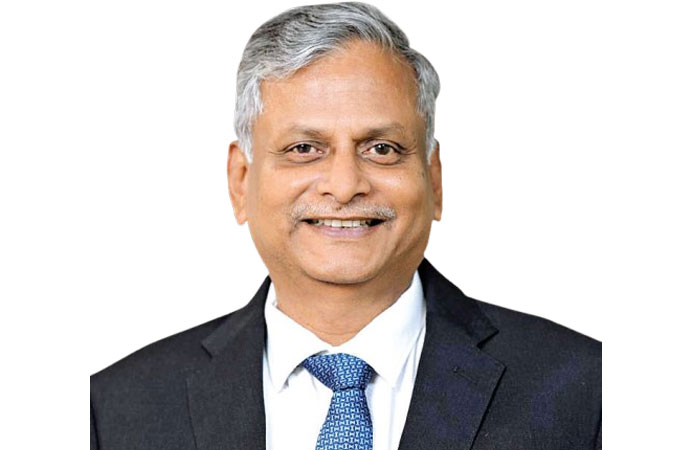
MSR Kali Prasad, Chief Digital and Information Officer, Shree Cement, discusses how data, discipline and scale are turning Industry 4.0 into everyday business reality.
Over the past five years, digitalisation in Indian cement manufacturing has moved decisively beyond experimentation. Today, it is a strategic lever for cost control, operational resilience and sustainability. In this interview, MSR Kali Prasad, Chief Digital and Information Officer, Shree Cement, explains how integrated digital foundations, advanced analytics and real-time visibility are helping deliver measurable business outcomes.
How has digitalisation moved from pilot projects to core strategy in Indian cement manufacturing over the past five years?
Digitalisation in Indian cement has evolved from isolated pilot initiatives into a core business strategy because outcomes are now measurable, repeatable and scalable. The key shift has been the move away from standalone solutions toward an integrated digital foundation built on standardised processes, governed data and enterprise platforms that can be deployed consistently across plants and functions.
At Shree Cement, this transition has been very pragmatic. The early phase focused on visibility through dashboards, reporting, and digitisation of critical workflows. Over time, this has progressed into enterprise-level analytics and decision support across manufacturing and the supply chain,
with clear outcomes in cost optimisation, margin protection and revenue improvement through enhanced customer experience.
Equally important, digital is no longer the responsibility of a single function. It is embedded into day-to-day operations across planning, production, maintenance, despatch and customer servicing, supported by enterprise systems, Industrial Internet of Things (IIoT) data platforms, and a structured approach to change management.
Which digital interventions are delivering the highest ROI across mining, production and logistics today?
In a capital- and cost-intensive sector like cement, the highest returns come from digital interventions that directly reduce unit costs or unlock latent capacity without significant capex.
Supply chain and planning (advanced analytics): Tools for demand forecasting, S&OP, network optimisation and scheduling deliver strong returns by lowering logistics costs, improving service levels, and aligning production with demand in a fragmented and regionally diverse market.
Mining (fleet and productivity analytics): Data-led mine planning, fleet analytics, despatch discipline, and idle-time reduction improve fuel efficiency and equipment utilisation, generating meaningful savings in a cost-heavy operation.
Manufacturing (APC and process analytics): Advanced Process Control, mill optimisation, and variability reduction improve thermal and electrical efficiency, stabilise quality and reduce rework and unplanned stoppages.
Customer experience and revenue enablement (digital platforms): Dealer and retailer apps, order visibility and digitally enabled technical services improve ease of doing business and responsiveness. We are also empowering channel partners with transparent, real-time information on schemes, including eligibility, utilisation status and actionable recommendations, which improves channel satisfaction and market execution while supporting revenue growth.
Overall, while Artificial Intelligence (AI) and IIoT are powerful enablers, it is advanced analytics anchored in strong processes that typically delivers the fastest and most reliable ROI.
How is real-time data helping plants shift from reactive maintenance to predictive and prescriptive operations?
Real-time and near real-time data is driving a more proactive and disciplined maintenance culture, beginning with visibility and progressively moving toward prediction and prescription.
At Shree Cement, we have implemented a robust SAP Plant Maintenance framework to standardise maintenance workflows. This is complemented by IIoT-driven condition monitoring, ensuring consistent capture of equipment health indicators such as vibration, temperature, load, operating patterns and alarms.
Real-time visibility enables early detection of abnormal conditions, allowing teams to intervene before failures occur. As data quality improves and failure histories become structured, predictive models can anticipate likely failure modes and recommend timely interventions, improving MTBF and reducing downtime. Over time, these insights will evolve into prescriptive actions, including spares readiness, maintenance scheduling, and operating parameter adjustments, enabling reliability optimisation with minimal disruption.
A critical success factor is adoption. Predictive insights deliver value only when they are embedded into daily workflows, roles and accountability structures. Without this, they remain insights without action.
In a cost-sensitive market like India, how do cement companies balance digital investment with price competitiveness?
In India’s intensely competitive cement market, digital investments must be tightly linked to tangible business outcomes, particularly cost reduction, service improvement, and faster decision-making.
This balance is achieved by prioritising high-impact use cases such as planning efficiency, logistics optimisation, asset reliability, and process stability, all of which typically deliver quick payback. Equally important is building scalable and governed digital foundations that reduce the marginal cost of rolling out new use cases across plants.
Digitally enabled order management, live despatch visibility, and channel partner platforms also improve customer centricity while controlling cost-to-serve, allowing service levels to improve without proportionate increases in headcount or overheads.
In essence, the most effective digital investments do not add cost. They protect margins by reducing variability, improving planning accuracy, and strengthening execution discipline.
How is digitalisation enabling measurable reductions in energy consumption, emissions, and overall carbon footprint?
Digitalisation plays a pivotal role in improving energy efficiency, reducing emissions and lowering overall carbon intensity.
Real-time monitoring and analytics enable near real-time tracking of energy consumption and critical operating parameters, allowing inefficiencies to be identified quickly and corrective actions to be implemented. Centralised data consolidation across plants enables benchmarking, accelerates best-practice adoption, and drives consistent improvements in energy performance.
Improved asset reliability through predictive maintenance reduces unplanned downtime and process instability, directly lowering energy losses. Digital platforms also support more effective planning and control of renewable energy sources and waste heat recovery systems, reducing dependence on fossil fuels.
Most importantly, digitalisation enables sustainability progress to be tracked with greater accuracy and consistency, supporting long-term ESG commitments.
What role does digital supply chain visibility play in managing demand volatility and regional market dynamics in India?
Digital supply chain visibility is critical in India, where demand is highly regional, seasonality is pronounced, and logistics constraints can shift rapidly.
At Shree Cement, planning operates across multiple horizons. Annual planning focuses on capacity, network footprint and medium-term demand. Monthly S&OP aligns demand, production and logistics, while daily scheduling drives execution-level decisions on despatch, sourcing and prioritisation.
As digital maturity increases, this structure is being augmented by central command-and-control capabilities that manage exceptions such as plant constraints, demand spikes, route disruptions and order prioritisation. Planning is also shifting from aggregated averages to granular, cost-to-serve and exception-based decision-making, improving responsiveness, lowering logistics costs and strengthening service reliability.
How prepared is the current workforce for Industry 4.0, and what reskilling strategies are proving most effective?
Workforce preparedness for Industry 4.0 is improving, though the primary challenge lies in scaling capabilities consistently across diverse roles.
The most effective approach is to define capability requirements by role and tailor enablement accordingly. Senior leadership focuses on digital literacy for governance, investment prioritisation, and value tracking. Middle management is enabled to use analytics for execution discipline and adoption. Frontline sales and service teams benefit from
mobile-first tools and KPI-driven workflows, while shop-floor and plant teams focus on data-driven operations, APC usage, maintenance discipline, safety and quality routines.
Personalised, role-based learning paths, supported by on-ground champions and a clear articulation of practical benefits, drive adoption far more effectively than generic training programmes.
Which emerging digital technologies will fundamentally reshape cement manufacturing in the next decade?
AI and GenAI are expected to have the most significant impact, particularly when combined with connected operations and disciplined processes.
Key technologies likely to reshape the sector include GenAI and agentic AI for faster root-cause analysis, knowledge access, and standardisation of best practices; industrial foundation models that learn patterns across large sensor datasets; digital twins that allow simulation of process changes before implementation; and increasingly autonomous control systems that integrate sensors, AI, and APC to maintain stability with minimal manual intervention.
Over time, this will enable more centralised monitoring and management of plant operations, supported by strong processes, training and capability-building.
Concrete
Cement Additives for Improved Grinding Efficiency
Published
4 days agoon
February 20, 2026By
admin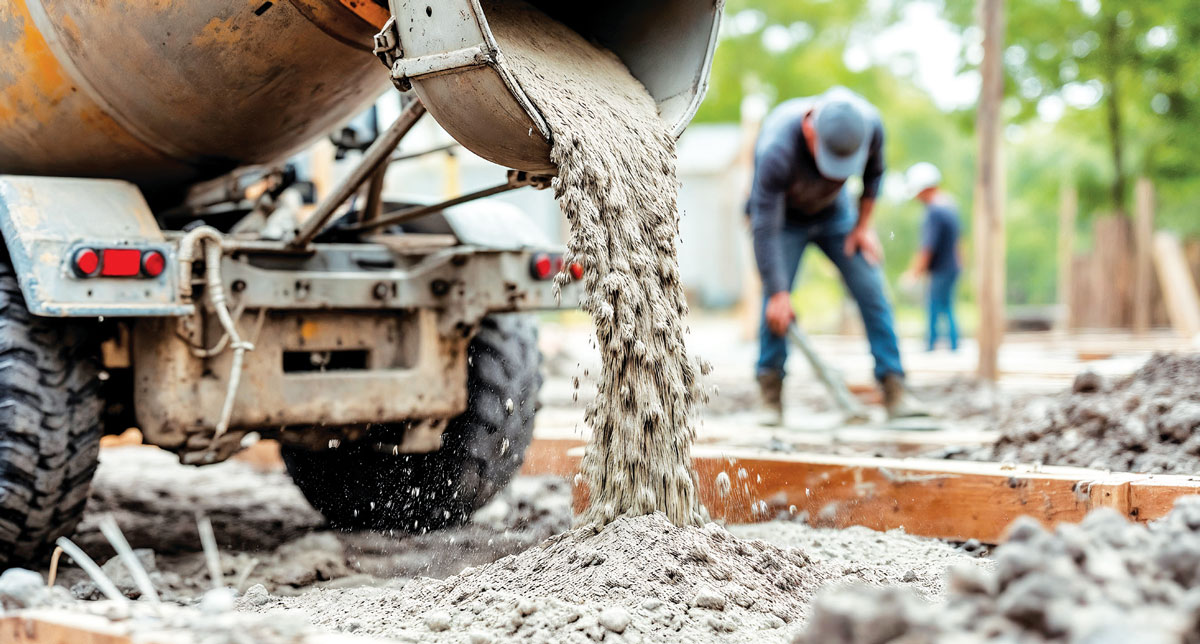
Shreesh A Khadilkar discusses how advanced additive formulations allow customised, high-performance and niche cements—offering benefits while supporting blended cements and long-term cost and carbon reduction.
Cement additives are chemicals (inorganic and organic) added in small amounts (0.01 per cent to 0.2 per cent by weight) during cement grinding. Their main job? Reduce agglomeration, prevent pack-set, and keep the mill running smoother. Thus, these additions primarily improve, mill thru-puts, achieve lower clinker factor in blended cements PPC/PSC/PCC. Additionally, these additives improve concrete performance of cements or even for specific special premium cements with special USPs like lower setting times or for reduced water permeability in the resultant cement mortars and concrete (water repellent /permeation resistant cements), corrosion resistance etc.
The cement additives are materials which could be further differentiated as:
Grinding aids:
• Bottlenecks in cement grinding capacity, such materials can enhance throughputs
• Low specific electrical energy consumption during cement grinding
• Reduce “Pack set” problem and improve powder flowability
Quality improvers:
• Opportunity for further clinker factor reduction
• Solution for delayed cement setting or strength development issues at early or later ages.
Others: materials which are used for specific special cements with niche properties as discussed in the subsequent pages.
When cement additives are used as grinding aids or quality improvers, in general the additives reduce the inter-particle forces; reduce coating over grinding media and mill internals. Due to creation of like charges on cement particles, there is decreased agglomeration, much improved flowability, higher generation of fines better dispersion of particles in separator feed and reduction of mill filling level (decrease of residence time). However, in VRM grinding; actions need to be taken to have stable bed formation on the table.
It has been reported in literature and also substantiated by a number of detailed evaluations of different cement additive formulations in market, that the cement additive formulations are a combination of different chemical compounds, typically composed of:
- Accelerator/s for the hydration reaction of cements which are dependent on the acceleration effect desired in mortar compressive strengths at early or later ages, the choice of the materials is also dependent on clinker quality and blending components (flyash / slag) or a mix of both.
- Water reducer / workability / wet-ability enhancer, which would show impact on the resultant cement mortars and concrete. Some of the compounds (retarders) like polysaccharide derivatives, gluconates etc., show an initial retarding action towards hydration which result in reducing the water requirements for the cements thus act as water reducers, or it could be some appropriate polymeric molecules which show improved wet-ability and reduce water demand. These are selected based on the mineral component and type of cements (PPC/PSC /PCC).
- Grinding aids: Compounds that work as Grinding Aid i.e. which would enhance Mill thru-put on one hand as well as would increase the early strengths due to the higher fines generation/ or activation of cement components. These compounds could be like alkanol-amines such as TIPA, DEIPA, TEA etc. or could be compounds like glycols and other poly-ols, depending on whether it is OPC or PPC or PSC or PCC manufacture.
Mechanism of action — Step By Step—
- Reduce Agglomeration, Cement particles get electrostatically charged during grinding, stick together, form “flocs”, block mill efficiency, waste energy. Grinding aid molecules adsorb onto particle surfaces, neutralise charge, prevent re-agglomeration.
- Improve Powder Flowability, Adsorbed molecules create a lubricating layer, particles slide past each other easier, better mill throughput, less “dead zone” buildup.
Also reduces caking on mill liners, diaphragms, and separator screens, less downtime for cleaning. - Enhance Grinding Efficiency (Finer Product Faster), By preventing agglomeration, particles stay dispersed more surface area exposed to grinding media, finer grind achieved with same energy input, Or: same fineness achieved with less energy, huge savings.
Example:
• Without aid ? 3500 cm²/g Blaine needs 40 kWh/ton
• With use of optimum grinding aid same fineness at 32 kWh/ton 20 per cent energy savings - Reduce Pack Set and Silo Caking Grinding aids (GA) inhibit hydration of free lime (CaO) during storage prevents premature hardening or “pack set” in silos. especially critical in humid climates or with high free lime clinker.
It may be stated here that Overdosing of GA can cause: – Foaming in mill (especially with glycols) reduces grinding efficiency, retardation of cement setting (especially with amines/acids), odor issues (in indoor mills) – Corrosion of mill components (if acidic aids used improperly)
The best practice to optimise use of GA is Start with 0.02 per cent to 0.05 per cent dosage test fineness, flow, and set time adjust up/down. Due to static charge of particles, the sample may stick to the sides of sampler pipe and so sampling need to be properly done.
Depending on type of cements i.e. OPC, PPC, PSC, PCC, the grinding aids combinations need to be optimised, a typical Poly carboxylate ether also could be a part of the combo grinding aids
Cement additives for niche properties of the cement in concrete.
The cement additives can also be tailor made to create specific niche properties in cements, OPC, PPC, PSC and PCC to create premium or special brands. The special niche properties of the cement being its additional USP of such cement products, and are useful for customers to build a durable concrete structure with increased service life.
Such properties could be:
• Additives for improved concrete performance of cements, high early strength in PPC/PSC/PCC, much reduced water demand in cement, cements with improved slump retentivity in concrete, self-compacting, self levelling in concrete, cements with improved adhesion property of the cement mortar
• Water repellence / water proofing, permeability resistance in mortars and concrete.
• Biocidal cement
• Photo catalytic cements
• Cements with negligible ASR reactions etc.
Additives for cements for improved concrete performance
High early strengths: Use of accelerators. These are chemical compounds which enhance the degree of hydration of cement. These can include setting or hardening accelerators depending on whether their action occurs in the plastic or hardened state respectively. Thus, the setting accelerators reduce the setting time, whereas the hardening accelerators increase the early age strengths. The setting accelerators act during the initial minutes of the cement hydration, whereas the hardening accelerators act mainly during the initial days of hydration.
Chloride salts are the best in class. However, use of chloride salts as hardening accelerators are strongly discouraged for their action in promoting the corrosion of rebar, thus, chloride-free accelerators are preferred. The hardening accelerators could be combinations of compounds like nitrate, nitrite and thiocyanate salts of alkali or alkaline earth metals or thiosulphate, formate, and alkanol amines depending on the cement types.
However, especially in blended cements (PPC/PSC/PCC the increased early strengths invariably decrease the 28 day strengths. These aspects lead to creating combo additives along with organic polymers to achieve improved early strengths as well as either same or marginally improved 28 days strengths with reduced clinker factor in the blended cement, special OPC with reduced admixture requirements. With use of appropriate combination of inorganic and organic additives we could create an OPC with substantially reduced water demand or improved slump retentivity. Use of such an OPC would show exceptional concrete performance in high grade concretes as it would exhibit lower admixture requirements in High Grade Concretes.
PPC with OPC like properties: With the above concept we could have a PPC, having higher percentage flyash, with a combo cement additive which would have with concrete performance similar to OPC in say M40/M50 concrete. Such a PPC would produce a high-strength PPC concrete (= 60 MPa @ 28d) + improved workability, durability and sustainability.
Another interesting aspect could also be of using ultrafine fine flyash /ultrafine slags as additions in OPC/PPC/PSC for achieving lower clinker factor as well as to achieve improved later age strengths with or without a combo cement additive.
The initial adhesion property at sites of especially PPC/PSC/PCC based mortars can be improved through use of appropriate organic polymers addition during the manufacture of these cements. Such cements would have a better adhesion property for plastering/brick bonding etc., as it has much lower rebound loss of their mortars in such applications.
It is needless to mention here that with use of additives, we could also have cement with viscosity modifying cement additives, for self-compaction and self-leveling concrete performance.
Use of Phosphogypsum retards the setting time of cements, we can use additive different additive combos to overcome retardation and improve the 1 day strengths of the cements and concretes.
About the author:
Shreesh Khadilkar, Consultant & Advisor, Former Director Quality & Product Development, ACC, a seasoned consultant and advisor, brings over 37 years of experience in cement manufacturing, having held leadership roles in R&D and product development at ACC Ltd. With deep expertise in innovative cement concepts, he is dedicated to sharing his knowledge and improving the performance of cement plants globally.

Refractory demands in our kiln have changed

Digital supply chain visibility is critical

Redefining Efficiency with Digitalisation

Cement Additives for Improved Grinding Efficiency

Digital Pathways for Sustainable Manufacturing

Refractory demands in our kiln have changed

Digital supply chain visibility is critical

Redefining Efficiency with Digitalisation

Cement Additives for Improved Grinding Efficiency

Digital Pathways for Sustainable Manufacturing
Trending News
-

 Concrete4 weeks ago
Concrete4 weeks agoAris Secures Rs 630 Million Concrete Supply Order
-

 Concrete4 weeks ago
Concrete4 weeks agoNITI Aayog Unveils Decarbonisation Roadmaps
-

 Economy & Market3 weeks ago
Economy & Market3 weeks agoBudget 2026–27 infra thrust and CCUS outlay to lift cement sector outlook
-

 Concrete3 weeks ago
Concrete3 weeks agoJK Cement Commissions 3 MTPA Buxar Plant, Crosses 31 MTPA



